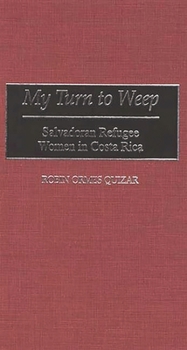My Turn to Weep: Salvadoran Refugee Women in Costa Rica
Salvadoran refugee women tell their stories of escape from El Salvador during some of the worst years of civil unrest (1979-1981) and their subsequent adaptation to refugee life in Costa Rica. These stories--called testimonios--are interwoven against the backdrop of their children's daycare center. The women's complex relationships with one another and the ambiguous nature of their interactions with the author as ethnographer are examined. The author's voice is used in the text to place the women in their historical and cultural context.
The daily lives and the testimonios of the refugees serve as an eloquent expression of the multidimensional feminism that has developed in Latin America. In contrast to mainstream feminism in the United States that focuses primarily on the power relationships between men and women, the concern of Latin American feminism is with power asymmetries in socioeconomic class, ethnicity, and religion, as well as gender. The women, whose daycare center is supported by international funding, rely on their cultural traditions to survive in the face of tragedy and oppression.Format:Hardcover
Language:English
ISBN:0897895401
ISBN13:9780897895408
Release Date:March 1998
Publisher:Praeger
Length:216 Pages
Weight:1.15 lbs.
Dimensions:0.9" x 6.4" x 9.5"
Customer Reviews
0 rating





